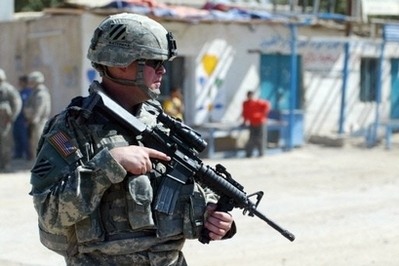US military groomed TV military analysts: report
(Agencies)
Updated: 2008-04-22 10:16
Updated: 2008-04-22 10:16
NEW YORK -- Many US military analysts used as commentators on Iraq by television networks have been groomed by the Pentagon, leaving some feeling they were manipulated to report favorably on the Bush administration, The New York Times said in Sunday editions.
A Times report examining ties between the Bush administration and former senior officers who acted as paid TV analysts said they got private briefings, trips and access to classified intelligence meant to influence their comments.
|
|
"Records and interviews show how the Bush administration has used its control over access and information in an effort to transform the analysts into a kind of media Trojan horse -- an instrument intended to shape terrorism coverage from inside the major TV and radio networks," the newspaper said.
The Pentagon defended its work with the analysts, saying they were given only accurate information.
Many of the commentators also have ties to military contractors who are vested in US war efforts, but those business links are seldom disclosed to viewers, and sometimes not even to the networks on which they appear, the newspaper said.
President George W. Bush has been engaged in a long struggle to halt a drain in public support for the Iraq war, in which more than 4,000 American soldiers have died, and to boost support for his post September 11 war against terrorism.
One case cited by the Times was in the summer of 2005, when accusations were rife over human rights violations at the US detention center at Guantanamo Bay on Cuba, where foreign terrorism suspects are held.
The Times said administration communications officials flew a group of retired military officers to the camp on a jet normally used by Vice President Dick Cheney to give their side of the case. Many in the group have subsequently appeared as commentators on the TV networks.
The Times quoted Robert Bevelacqua, a retired Green Beret and former Fox News analyst, as saying, "It was them (the Bush administration) saying, 'We need to stick our hands up your back and move your mouth for you."'
"I FELT WE'D BEEN HOSED"
Kenneth Allard, a former NBC military analyst who taught information warfare at the National Defense University, told the Times the campaign amounted to a "coherent, active," sophisticated information operation.
As the situation in Iraq deteriorated, he saw a gap between what analysts were told in private briefings and what subsequently was revealed in inquiries and books.
"Night and day," he told the Times. "I felt we'd been hosed."
Some analysts said they had suppressed doubts about the situation in Iraq for fear of jeopardizing their access.
Many others, however, denied having been co-opted or allowing their business interests to affect their on-air work, while some said they had recused themselves from coverage that touched on business interests, the Times report said.
The Times said it based much of its report on 8,000 pages of e-mail messages, transcripts and records it secured by suing the Defense Department and which it said described years of private briefings, trips and what it called "an extensive Pentagon talking points operation."
It said Pentagon documents referred to the military analysts as "message force multipliers" or "surrogates" who could be counted on to deliver administration "themes and messages" to millions of Americans "in the form of their own opinions."
Pentagon spokesman Bryan Whitman defended the Defense Department's work with military analysts, saying they were given only factual information about the war.
"The intent and purpose of this is nothing other than an earnest attempt to inform the American people," he told the Times, adding it was "a bit incredible" to think retired military officers could be "wound up" and used as "puppets of the Defense Department."
|
||
|
||
|
|
|
|
